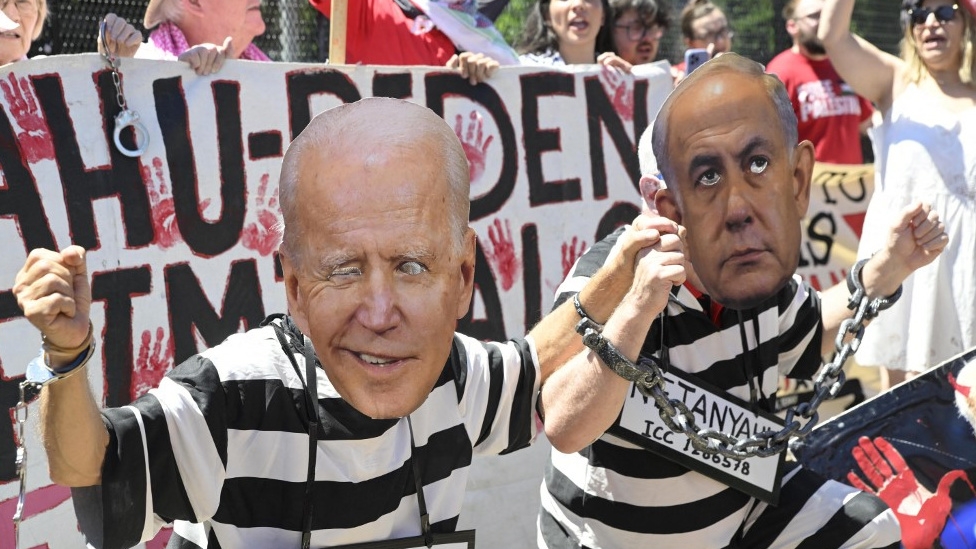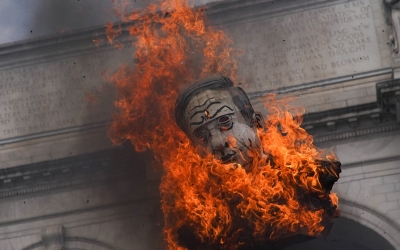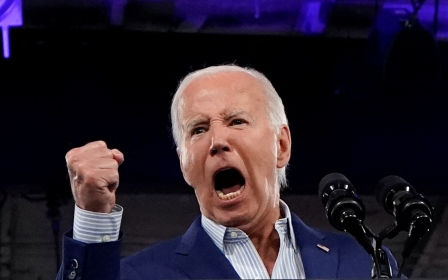Israel is rudderless, and Washington is going down with the ship

The assassination of Hamas political chief Ismail Haniyeh has once again underscored Israel’s lack of strategic direction.
Tel Aviv has proven itself incapable of being a partner in any framework of peace, stability or cooperation. It remains incapable of interrogating its past, confronting its present, or envisioning a clear future.
Israel is caught in the liminal space of being a project and a state, juxtaposed between an apartheid regime and a democratic nation, straddling the line between a start-up country and a mature nation. It oscillates between historical prophecy and modern reality, balancing the dichotomy of religious fanaticism and rule of law.
It is an ethnocratic and overtly racist state, but it is heralded by western capitals as the “only democracy in the Middle East”. While actively engaged in ethnic cleansing, it simultaneously clamours for its “right to exist”.
This identity crisis feeds a vicious cycle. This mindset, which has long believed that Palestinian resistance can be quelled through occupation, massacres, exile, genocide and assassinations, will inevitably escalate the conflict.
New MEE newsletter: Jerusalem Dispatch
Sign up to get the latest insights and analysis on Israel-Palestine, alongside Turkey Unpacked and other MEE newsletters
The existence of Israel as a project in the Middle East is not particularly striking. Amid regional countries emerging from the wreckage of world wars, themselves still nascent states, the fact that the victorious powers forcibly established Israel in the Middle East was unsurprising. It was a challenging endeavour, but one realised with the unwavering support of the victors.
What is truly remarkable is the Palestinian resistance that has persisted for nearly a century, despite the overwhelming asymmetry in military, economic and diplomatic power.
Geopolitical invention
The emergence of Israel, an unparalleled geopolitical invention, coincided with the Ottoman withdrawal from the Syrian-Palestinian front. Following Zionist terrorism by groups such as Irgun, Lehi, Haganah and Palmach leading to the 1948 establishment of Israel, the state today remains ensnared in a self-created world of terror.
When a movement’s relationship with violence remains constant in times of both strength and weakness, before and after achieving its goals, this indicates a profound existential crisis. So what does Israel want; or rather, what does it aspire to be?
Follow Middle East Eye's live coverage of the Israel-Palestine war
Most recognised states can articulate coherent responses to such questions, at least from their own perspective. But Israel’s crisis precludes any clear answers, regardless of the assessments of its interlocutors.
Responses to this question invariably enumerate what Israel opposes. Israel rejects the creation of a Palestinian state, or of a single state where Palestinians would be equal citizens. It denies Palestinians’ right to exist, despite their demographic majority.
Israel also rejects any peace with the Palestinian people. Its last head of state who attempted peace was assassinated.
Washington's misguided policy on Israel manifested, as a sort of punishment, this surreal congressional spectacle
To this day, Israel aims to perpetuate its occupation and massacres, secured by the world’s most expensive geopolitical insurance policy in Washington. It opposes any regional peace initiative or ceasefire, resisting both comprehensive solutions and specific steps towards a resolution.
Dozens of countries still do not recognise Israel, while many more refrain from deepening ties with it. In recent months, millions of people worldwide have taken to the streets to protest Israel’s war on Gaza.
Yet still, Israel expects to be treated as a normal state - even as it shows no interest in being a truly democratic nation. It remains committed to occupation, apartheid and colonial rule. It disregards international law.
As a country facing genocide charges, it threatens international courts, as does the US. It describes Unrwa, the United Nations agency that operates as a lifeline for Palestinians, as a terrorist organisation.
Disputed borders
Israel’s borders and capital are disputed. Observing US Congress members who exuberantly applauded Israeli Prime Minister Benjamin Netanyahu during his recent visit, one might question whether Israel is better represented in the Knesset or in Washington.
The meticulously orchestrated proceedings in the US Congress illustrated to the world that Israel no longer requires a lobby in the United States. The entire world watched as the Israel lobby - the subject of numerous books, articles and conspiracy theories - dissolved, only to be replaced by what we might call the Israeli Congress in Washington.
This shift recalled Netanyahu’s declaration months earlier: “We are not a vassal state of the United States.” It also underscored the necessity of redefining the roles within this bilateral relationship if Israel is not subordinate to the US.
Netanyahu received in Washington a level of attention and applause that he would never get in the Knesset. His speech was dismissed globally as a reiteration of Zionist policies, an attempted defence of ongoing massacres and a shameless declaration that the genocide of Palestinians will continue.
Indeed, what stood out was not Netanyahu’s speech, but the audience reaction, as US Congress members on both sides of the aisle stood up dozens of times to applaud a man committing genocide before the eyes of the world.
Washington’s misguided policy on Israel manifested, as a sort of punishment, this surreal congressional spectacle. Congress members are well aware that should they fail to fanatically support Israel, they could be expelled from Washington.
In this way, the Israel lobby’s function in Washington has become redundant. The transformation of the American Congress into the “Israeli Congress” signifies that US politics is now captive to the logic that President Joe Biden once summarised by saying: “If there were not an Israel, we’d have to invent one.”
Profound suffering
After 10 months of relentless massacres in Gaza, Israel’s enduring legacy entails not only the profound suffering of the Palestinian people, but also the disgraceful complicity of the West. Both the region and the world face a significant Israel problem.
The Zionist project, the attempt to dominate another nation, has evidently failed. Moreover, under the control of a reckless power uncertain of its future actions, a severe humanitarian crisis is unfolding, exacerbating regional and global geopolitical risks.
The assassination of Haniyeh certainly increased the risk of regional war. But none of the regional actors are likely to prefer a conventional war with Israel.
Even the Islamic State group (IS), a complex and decentralised organisation lacking local support, has survived in some form or another for years, despite a global effort against it. The Palestinian resistance and cause, which has gained stronger global support in recent months than ever before, is sure to generate new and multifaceted security challenges in the days ahead. This energy will inevitably entail both positive and negative forces, including the dynamics of terrorism.
The geopolitical myopia in Washington and Europe cannot shield Israel from these threats. Its dehumanisation of Palestinians and persistent violations of international law have ensnared western capitals in a web of diplomatic and strategic entanglements.
The emerging pro-Palestine consensus around the globe could reshape this geopolitical landscape, influencing not only the West, but also regional countries and the Global South. Even China is cautiously engaging in the peace process.
If harnessed efficiently and carefully, this momentum could create new opportunities for Palestine. Given the political instability in Washington, the need for a regional initiative supported by diverse global actors has never been more critical.
New leadership
The only scenario that can truly apply pressure on Israel and the US is one in which the Palestinian people achieve unity and elect new political representatives. Crucially, this scenario will involve regional actors altering the status quo in their relations with Israel.
It is vital to progress to a stage where totally new Palestinian national representation can emerge through a process of Palestinian-run elections, despite the ongoing occupation and war.
No external force can rescue Israel from this problem. In essence, Israel's future is inextricably linked to the existence of Palestine
Regional countries now face a choice: either channel the energy generated by Palestinian resilience positively, or contend with its negative repercussions throughout the region.
Israel has terminated any meaningful channels between Tel Aviv and much of the world. Most nations have learned that there is nothing to discuss or debate with Israel.
Israel does not just have a Hamas problem; it has problems with all Palestinians, with the region and with international law. It is now time for both Palestinians and regional actors to negotiate directly with Washington about the Israel problem.
Ironically, only a resolution to the Palestinian issue can address the Israel problem. Absent such a settlement, Israel will remain unwilling to acknowledge, let alone embrace, the imperative of a ceasefire.
No external force can rescue Israel from this problem. In essence, Israel's future is inextricably linked to the existence of Palestine. By perpetuating genocidal policies, Israel risks undermining its own raison d'etre.
The views expressed in this article belong to the author and do not necessarily reflect the editorial policy of Middle East Eye.
Middle East Eye delivers independent and unrivalled coverage and analysis of the Middle East, North Africa and beyond. To learn more about republishing this content and the associated fees, please fill out this form. More about MEE can be found here.






